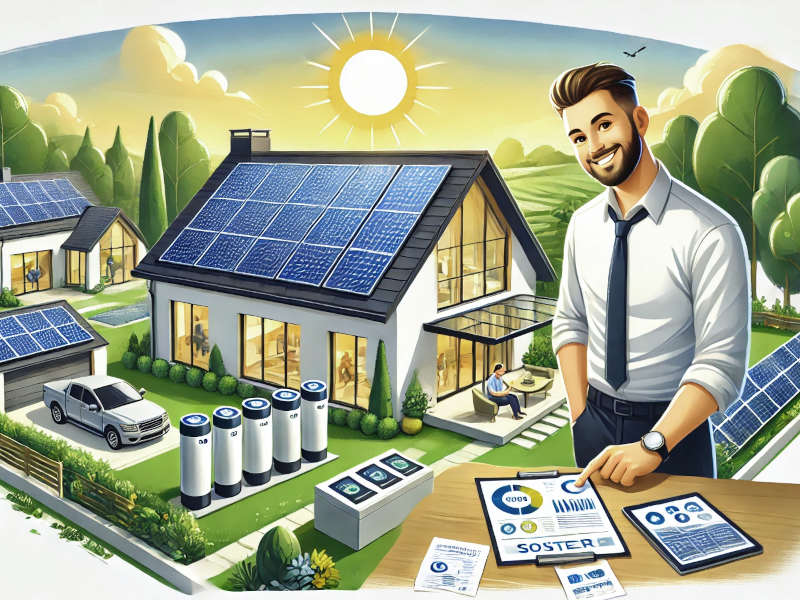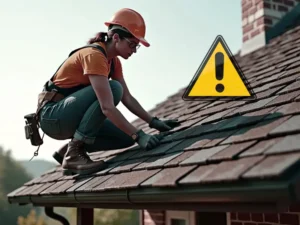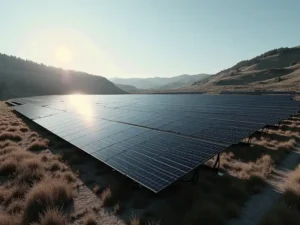What Are the Pros and Cons of Solar Panels for Homeowners? A Comprehensive Guide

18 minutes read time
Overview
Solar Energy’s Soaring Popularity
Did you know that the global solar energy market is projected to grow by over 20% annually, reaching unprecedented adoption levels? Homeowners everywhere are joining the green energy revolution, and solar panels are leading the charge. From slashing electricity bills to shrinking carbon footprints, the allure of solar power is undeniable—but is it the right choice for every home?
A Homeowner’s Dilemma
As energy prices continue to rise and climate change takes center stage, more homeowners are considering solar panels as a practical and environmentally friendly solution. Yet, for every homeowner who enjoys energy independence, there’s another who hesitates due to concerns about high upfront costs or the practicality of installation. Making an informed decision requires understanding both the bright side and the potential shadows of solar energy.
A Balanced Perspective
This comprehensive guide will illuminate the pros and cons of solar panel installation, empowering you to make an informed choice. Whether you’re drawn to the promise of renewable energy or cautious about the costs, we’ll break down the key factors to help you decide. By the end, you’ll have a clear understanding of whether solar panels are a bright idea for your home—or if another energy solution might suit your needs better.
What’s Coming Next?
Get ready to explore the undeniable benefits of solar panels, from environmental impact to potential cost savings. But we won’t shy away from the challenges either—high upfront costs, maintenance, and other considerations will also take the spotlight. Let’s dive in and uncover the full picture of solar energy for homeowners.
What Are Solar Panels and How Do They Work?
Solar panels are like superheroes for your home—quietly transforming sunlight into usable electricity, all while just sitting there on your roof. At their core, these panels rely on photovoltaic (PV) cells, which are made from materials like silicon that can convert sunlight into energy. Fancy? Yes. Complex? Not so much once you break it down.
When sunlight hits the solar panels, the PV cells absorb energy from the sun. This energy excites the electrons in the cells, creating an electric current. That current flows into an inverter, a device that changes it from direct current (DC) to alternating current (AC)—the type of electricity your home appliances love. Voilà, you’ve got solar power.
Now, let’s talk about the panel types. Think of them as the flavors of solar energy.
Monocrystalline Panels: These are the premium option—sleek, efficient, and space-saving. They’re like the Tesla of solar panels.
Polycrystalline Panels: A bit less efficient but more affordable. Picture them as the reliable family sedan.
Thin-Film Panels: Lightweight and flexible but less efficient overall. They’re the budget-friendly bike in this metaphorical energy garage.
Installing solar panels usually means placing them on a south-facing roof or an open yard, where they can bask in uninterrupted sunshine. If your roof is shaded or oddly shaped, don’t worry—you’ve got options. Ground-mounted systems or innovative technologies like solar trackers might be a better fit.
In short, solar panels harness free energy from the sun and convert it into electricity you can use for everything from brewing coffee to binging TV shows. Science is cool, but saving money and helping the planet? That’s even cooler.
Want to dive deeper into how these systems integrate with your home’s energy setup? Keep on reading — the next sections have plenty more light to shed on the topic!
The Benefits of Solar Panels for Homeowners
Solar panels offer many benefits, making them a great choice for homeowners. Let’s break down the perks so you can see why they’re becoming so popular.
Environmental Impact
Solar panels help the planet by using sunlight, a clean and renewable energy source, to create electricity. Unlike coal or natural gas, they don’t release harmful greenhouse gases. By installing solar panels, you reduce your carbon footprint and contribute to cleaner air. Think of it as giving the Earth a high-five every time the sun shines.
Energy Cost Savings
Who doesn’t love saving money? Solar panels can significantly lower your electricity bills. Once installed, they generate power for free. In sunny areas, they may even cover most or all of your energy needs. Over time, this adds up to big savings. Plus, some homeowners can sell extra energy back to the grid through net metering programs. It’s like getting paid to do the right thing for the planet.
Energy Independence
Relying on the utility company for power can be frustrating, especially during outages. Solar panels put you in control. Paired with a battery system, they store energy for use anytime, even during blackouts. It’s like having a backup generator without the noise or fuel costs.
Increased Property Value
Homes with solar panels often sell for more. Studies show buyers value the long-term energy savings and eco-friendly features. While the initial investment might feel steep, it could pay off if you sell your home. Think of it as an upgrade that pays dividends.
Tax Incentives and Rebates
Many governments offer incentives to encourage solar adoption. These include federal tax credits, state rebates, and local programs. These perks can significantly reduce the upfront cost of installation. Who doesn’t love a good deal?
Low Maintenance Requirements
Solar panels don’t require much attention. They’re durable, with a lifespan of 25-30 years. Occasional cleaning and an annual inspection are usually enough to keep them working well. Compared to fixing a leaky roof or a squeaky garage door, solar panel upkeep is a breeze.
Solar panels are a practical and environmentally friendly option. They save money, boost home value, and help you reduce your impact on the planet. But are they perfect? Not quite. The next section covers some challenges you’ll want to consider.
The Drawbacks of Solar Panels for Homeowners
Solar panels have many advantages, but they aren’t perfect. Like anything worth considering, they come with a few challenges. Let’s break down the cons, so you can decide if solar is the right choice for your home.
High Initial Costs
Let’s get the biggest downside out of the way: the price tag. Installing solar panels isn’t cheap. Between equipment and labor, the costs can range from $10,000 to $30,000 or more. While tax credits and rebates can take the sting out of the upfront expense, the initial investment is still a hurdle for many homeowners. On the bright side, those savings on your energy bills can eventually make up for it. Think of it as buying the fancy blender now to enjoy endless smoothies later.
Weather Dependency
Solar panels love sunshine. Unfortunately, they’re not as enthusiastic about clouds, rain, or snow. If you live in a cloudy or shady area, your panels won’t be as efficient. Winter months can also reduce their output since shorter days mean less sun exposure. That said, many systems are still effective in less-than-perfect weather—they just won’t hit peak performance every day.
Space Requirements
Solar panels need room to work their magic. If your roof is small, heavily shaded, or oddly shaped, installation can be tricky. A south-facing roof is ideal, but not everyone has one. In these cases, ground-mounted panels or creative placement might be necessary. Keep in mind, not all yards are ready to double as a solar farm. You’ll need space to spare.
Maintenance and Repair Issues
Solar panels are pretty low-maintenance, but they’re not entirely hands-off. You’ll need to clean them occasionally to remove dirt and debris that can block sunlight. Repairs are rare, but inverters or other components may need fixing or replacing over the years. The good news? Most systems come with warranties, so you won’t be left high and dry.
Aesthetic Concerns
Let’s be honest—solar panels aren’t everyone’s idea of curb appeal. While modern designs are sleeker, some people don’t love the look of panels on their roof. If you’re particular about aesthetics, this might be a sticking point. On the flip side, you can think of them as badges of honor for helping the planet.
End-of-Life Disposal and Environmental Concerns
Here’s a lesser-known issue: what happens when the panels wear out? While they last for decades, they’ll eventually need replacing. Recycling old panels isn’t always straightforward, and improper disposal can harm the environment. The solar industry is working to address this, but it’s worth keeping in mind.
Solar panels aren’t without flaws, but knowing the downsides helps you make a smarter decision. If these drawbacks don’t outweigh the benefits for you, solar might be a great option. Up next, let’s explore what you should consider before making the leap!
Factors to Consider Before Installing Solar Panels
Before diving into solar panel installation, it’s important to take a closer look at some key factors. Solar power can be an excellent investment, but it’s not a one-size-fits-all solution. Here’s what you need to think about before making your decision.
Your Energy Needs
Start by understanding how much energy your household uses. Look at your electricity bills to find your monthly and annual consumption. A smaller home with minimal power usage might need fewer panels, while a larger family home with lots of gadgets and appliances will require more. Knowing your energy needs helps you plan the size of your system.
Sunlight and Location
Your home’s location plays a huge role in solar panel efficiency. Homes in sunny regions generate more power, while areas with frequent clouds or limited daylight hours might see lower performance. If your roof faces south or west, you’re in luck—these directions get the most sunlight. Homes with shaded roofs or obstructed views of the sky might need to explore alternative placements like ground-mounted panels.
Roof Condition
Solar panels are a long-term investment, so your roof needs to be ready for the job. A roof in poor condition might need repairs or replacement before installation. Panels are heavy and can last 25 years or more, so it’s essential to ensure your roof can handle the load. Think of it this way: you wouldn’t put new tires on a car with a crumbling frame, right?
Upfront Costs and Financing Options
Solar panels aren’t cheap, but there are ways to make them more affordable. Research tax credits, rebates, and financing options in your area. Many governments and utilities offer programs to offset installation costs. Some companies also provide leasing or payment plans. Make sure you understand the total cost and how long it will take to break even through energy savings.
Long-Term Savings
Solar panels are an investment, and it’s important to know how long it will take to see financial benefits. Calculate your potential savings over 10, 15, or 20 years. Keep in mind that savings depend on energy rates, system efficiency, and how much sunlight your home receives. While you may not see immediate results, the long-term payback can be substantial.
Maintenance Needs
Solar panels don’t need much upkeep, but they’re not completely maintenance-free. Dust, leaves, and snow can reduce their efficiency, so occasional cleaning is necessary. Some homeowners handle this themselves, while others hire professionals. Also, remember that components like inverters may need replacing during the system’s lifespan.
Homeowner Association Rules and Permits
If you live in a neighborhood with a homeowner association (HOA), check the rules about solar panel installation. Some HOAs have restrictions on appearance or placement. You’ll also need to obtain permits from your local government. While these steps can take time, they’re manageable with the help of your installer.
Battery Storage Options
If you want to maximize your energy independence, consider adding a battery system. Batteries store excess energy produced during the day for use at night or during power outages. They increase upfront costs but can make your solar system more versatile.
Taking the time to evaluate these factors helps ensure your solar panel installation meets your needs and expectations. It’s all about planning ahead so you can enjoy years of clean energy and lower bills. Ready to move forward? Let’s recap the key points to help you decide!
Is Solar Right for You? How to Make the Final Decision
Deciding whether to install solar panels is like picking a movie for movie night—it depends on your preferences, budget, and what you’re looking to get out of it. Here’s a step-by-step guide to help you decide if solar is the right choice for you.
Assess Your Financial Situation
Solar panels save money in the long run, but the initial cost can feel like a splash of cold water. If you’re in a position to handle the upfront expense or qualify for financing, this investment could make sense. Look into tax credits, rebates, and low-interest loans to lighten the load. If your energy bills look like they belong to a five-star resort, solar panels might be the relief your wallet needs.
Evaluate Your Home’s Suitability
Take a good look at your roof and its surroundings. Is your roof large, sturdy, and mostly sunlit? Then it’s a prime candidate for solar panels. If your home is surrounded by towering trees that cast more shade than a beach umbrella, you may need to consider trimming or alternative setups like ground-mounted panels.
Think About Your Long-Term Plans
Are you planning to stay in your home for the next 10 to 20 years? Solar panels are a commitment, and their benefits grow over time. If you’re thinking about moving soon, consider whether the added home value will justify the investment. Think of it like planting a tree—you’ll want to stick around to enjoy the shade.
Research Local Incentives and Policies
Energy regulations and incentives vary depending on where you live. Some areas offer generous programs, while others may have fewer benefits. Research local policies, net metering options, and any restrictions from homeowner associations. A little homework now can save you a lot of frustration later.
Weigh the Pros and Cons
Make a list of the benefits and drawbacks based on your situation. Are you excited about reducing your carbon footprint and gaining energy independence? Great! Are you worried about upfront costs or aesthetic changes to your home? That’s valid, too. Writing down these points can help clarify your thoughts.
Get Professional Opinions
Talk to a few solar panel installation companies. They can assess your property and provide detailed quotes. Compare their recommendations to ensure you’re getting the best deal. Don’t hesitate to ask about warranties and service plans—peace of mind is priceless.
Consider Battery Options
If energy independence is your goal, think about adding a battery system. While this increases the initial cost, it also provides backup power during outages and maximizes your solar investment. Batteries are especially useful in areas with frequent blackouts or no net metering options.
Trust Your Instincts
Finally, trust your gut. If solar panels align with your financial goals, environmental values, and home’s potential, they could be the perfect fit. If they don’t quite check all the boxes, that’s okay too. The goal is to make a decision that feels right for you.
Solar panels are a fantastic option for many homeowners, but they aren’t a one-size-fits-all solution. Taking the time to evaluate your circumstances ensures you’ll make a choice you’re happy with—whether it’s going solar now or waiting until the time feels right. After all, the sun’s not going anywhere anytime soon!
Additional Elements to Consider
When thinking about solar panels, it’s easy to focus on the panels themselves. But there are a few extras that can enhance your solar setup or make the process smoother. Here’s a closer look at some elements that often fly under the radar but can make a big difference.
Battery Storage Systems
Adding a battery storage system to your solar setup lets you store excess energy for later use. This is especially helpful during the evening or on cloudy days when your panels aren’t producing as much power. Batteries are a great option for homes in areas with frequent power outages or those looking for more energy independence. While they increase the upfront cost, the convenience and peace of mind are often worth it. Think of it like having a spare tire—essential when things go flat.
Monitoring Systems
Modern solar setups often include monitoring systems that track energy production and consumption. These tools let you see how much energy your panels generate daily, weekly, or yearly. Some systems even show how your solar power usage compares to your grid electricity. It’s like having a Fitbit for your house, helping you optimize energy efficiency.
Warranties and Maintenance Plans
Solar panels are built to last, but a good warranty can save you a lot of headaches down the road. Check what’s covered and for how long. Does the warranty include just the panels, or does it also cover inverters and other components? Maintenance plans can also be helpful if you prefer leaving cleaning and minor repairs to professionals. A little upfront planning can spare you future frustrations.
Permits and Paperwork
Solar panel installation requires permits and inspections. Your installer often handles this, but it’s good to stay informed about what’s needed. Each city or county has its rules, and understanding them can prevent delays. It’s a bit like getting a driver’s license—there’s paperwork, but once it’s done, you’re ready to go.
Roof-Mounted vs. Ground-Mounted Systems
Most homeowners install panels on their roofs, but ground-mounted systems can be an excellent option for those with plenty of yard space. These setups make cleaning and maintenance easier, and they often get better sun exposure because they’re not limited by roof angles. They do take up more space, though, so they’re better for rural or suburban properties.
Future Upgrades
As solar technology improves, newer, more efficient systems will likely become available. Keeping this in mind, it’s worth choosing components that are compatible with potential upgrades. Some homeowners start with a small system and expand it over time as their budget or energy needs grow. Think of it as building a wardrobe—start with the essentials and add to it over time.
Considering these additional elements helps ensure your solar investment is as efficient and effective as possible. Each piece plays a role in maximizing the benefits of solar energy, from storage solutions to easy-to-use monitoring systems. By thinking about these extras, you can set up a system that works perfectly for your home and lifestyle.
Wrap up
Solar panels offer an exciting way to save money, reduce energy bills, and help the planet. They can be a great choice for many homeowners, but they’re not without challenges. Understanding the pros and cons helps you decide if they’re the right fit for your home and lifestyle.
Before jumping into solar, assess your energy needs, budget, and property. Take time to explore local incentives and speak with professionals who can guide you through the process. Solar energy is a long-term commitment, and careful planning ensures the benefits outweigh any potential drawbacks.
For homeowners ready to embrace clean energy, solar panels provide a chance to say goodbye to rising energy bills and hello to renewable power. If they don’t fit your situation today, don’t worry—solar technology is advancing rapidly, making it more accessible and efficient each year.
The decision to go solar should feel empowering. Whether you choose to install panels now or revisit the idea later, you’ve gained valuable insight to guide your path forward. After all, the sun will keep shining—your opportunity isn’t going anywhere.
In the end, choosing solar is about creating a brighter future for your home and the planet. So, if the idea of harvesting sunshine for energy makes you smile, it might be time to take the plunge. Your future self (and your utility bill) will thank you.






